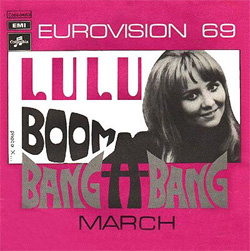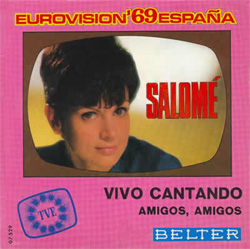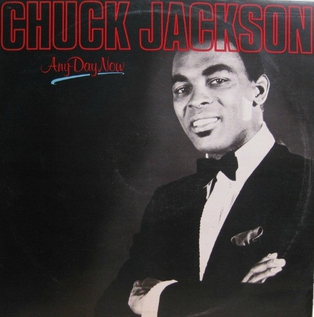April 25 is the 115th day of the year in the Gregorian calendar; 250 days remain until the end of the year.
1969 (MCMLXIX) was a common year starting on Wednesday of the Gregorian calendar, the 1969th year of the Common Era (CE) and Anno Domini (AD) designations, the 969th year of the 2nd millennium, the 69th year of the 20th century, and the 10th and last year of the 1960s decade.

List of notable events in music that took place in the year 1969.

Lulu Kennedy-Cairns is a Scottish singer, actress, and television personality. With a career spanning six decades, her debut single a cover version of The Isley Brothers song "Shout", reached the top ten of the UK Singles Charts in 1964. In 1967, she rose to international prominence after appearing in the box office film To Sir, with Love, singing the theme song which topped the US Billboard Hot 100 for five consecutive weeks.
The year 1969 in film involved some significant events, with Butch Cassidy and the Sundance Kid dominating the U.S. box office and becoming one of the highest-grossing films of all time and Midnight Cowboy, a film rated X, winning the Academy Award for Best Picture.

Ghantasala Venkateswararao, known mononymously by his surname as Ghantasala, was an Indian playback singer and film composer known for his works predominantly in Telugu and Kannada cinema and also in Tamil, Malayalam, Tulu and Hindi language films. He is considered one of the greatest singers of Telugu cinema. In 1970, he received the Padma Shri award, India's fourth highest civilian award for his contribution to Indian cinema. According to The Hindu and The Indian Express, Ghantasala was 'such a divine talent and with his songs he could move the hearts of the people'. 'Ghantasala's blending of classical improvisations to the art of light music combined with his virtuosity and sensitivity puts him a class apart, above all others in the field of playback singing'. Gifted with what Indian film historian V. A. K. Ranga Rao called 'the most majestic voice', Ghantasala helped Telugu film music develop its own distinct character which remains unparalleled. He is referred to as the 'Gaana Gandharva' for his mesmerising voice and musical skills.

The Lawrence Welk Show is an American televised musical variety show hosted by big band leader Lawrence Welk. The series aired locally in Los Angeles for four years, from 1951 to 1955, then nationally for another 16 years on ABC from 1955 to 1971, followed by 11 years in first-run syndication from 1971 to 1982. Repeat episodes are broadcast in the United States by Public Broadcasting Service (PBS) stations. These airings incorporate an original program—usually, a color broadcast from 1965 to 1982—in its entirety. In place of the commercials, newer performance and interview clips from the original stars and/or a family member of the performers are included; these clips are occasionally updated.

Maria Rosa Marco Poquet, better known by her stage name Salomé, is a Spanish singer.

The Sweet Inspirations are an American R&B girl group mostly known for their work as backup singers on studio recordings for other R&B and rock artists. A founding member of the group was Dionne Warwick, who was later replaced by her aunt, Cissy Houston.

Edwin Reuben Hawkins was an American gospel musician, pianist, vocalist, choir master, composer, and arranger. He was one of the originators of the urban contemporary gospel sound. As the leader of the Edwin Hawkins Singers, he was probably best known for his arrangement of "Oh Happy Day" (1968–69), which was included on the "Songs of the Century" list. In 1970, the Edwin Hawkins Singers made a second foray into the charts, backing folk singer Melanie on "Lay Down ".

"Boom Bang-a-Bang" is a song recorded by Scottish singer Lulu, with music composed by Alan Moorhouse and lyrics by Peter Warne. It represented the United Kingdom in the Eurovision Song Contest 1969, held in Madrid, and became one of the four winning songs. It made No. 2 in the UK Singles Chart and was a major hit throughout Europe.

The Les Humphries Singers was a pop vocal group formed in Hamburg, West Germany by English singer Les Humphries. Active from 1969 until 1980, the group had several chart hits in Germany and in other European countries. The group, whose music drew heavily from gospel, country, folk, R&B and psychedelic influences, was notable for its large number of members, which at times numbered over a dozen to 30. Several of its members, including John Lawton, Jürgen Drews and Liz Mitchell, went on to have notable careers of their own.

"Vivo cantando" is a song recorded by Spanish singer Salomé, written by composer María José de Ceratto and lyricist Aniano Alcalde. It represented Spain in the Eurovision Song Contest 1969 held in Madrid, and became one of the four winning songs and the second song from Spain –and last to date– to win.

"Oh Happy Day" is a 1967 gospel music arrangement of the 1755 hymn by clergyman Philip Doddridge. Recorded by the Edwin Hawkins Singers, it became an international hit in 1969, reaching No. 4 on the US Singles Chart, No. 1 in France, Germany, and the Netherlands and No. 2 on the Canadian Singles Chart, UK Singles Chart, and Irish Singles Chart. It has since become a gospel music standard, selling over 7 million copies worldwide, making it the second best-selling gospel song of all time.

Singer Presents Elvis Singing Flaming Star and Others is a compilation album by American singer and musician Elvis Presley, released by RCA Records on October 1, 1968. It spent five months available only at select retail stores featuring products by the Singer Sewing Machine Company as a promotional tie-in with Presley's upcoming Christmas television special on the NBC network, which Singer had sponsored. It was reissued for normal retail channels as Elvis Sings Flaming Star in April 1969, becoming the first Elvis Presley budget album on the RCA Camden label, catalogue CAS 2304. The 1969 release peaked at number 96 on the Billboard 200 album chart. It was certified Gold on July 15, 1999, and Platinum on January 6, 2004, by the Recording Industry Association of America.

"Any Day Now" is a popular song written by Burt Bacharach and Bob Hilliard in 1962. It has been recorded by numerous artists over the years, including notable versions by Chuck Jackson in 1962, Alan Price in 1965, Elvis Presley in 1969, Scott Walker in 1973 and Ronnie Milsap in 1982. In the lyrics, the singer predicts the imminent demise of a romantic relationship and describes the sadness this will leave.
"Johnny One Time" is a song written by A.L. "Doodle" Owens and Dallas Frazier and performed by Brenda Lee. The song reached #3 on the adult contemporary chart, #41 on the Billboard Hot 100, and #50 on the country chart in 1969. The song also reached #11 on the Canadian adult contemporary chart and #38 on the Canadian pop chart. It was featured on her 1969 album, Johnny One Time.
"Love Me Tonight" is a song performed by Tom Jones. It reached #2 on the adult contemporary chart, #9 on the UK Singles Chart, and #13 on the U.S. pop chart in 1969.












